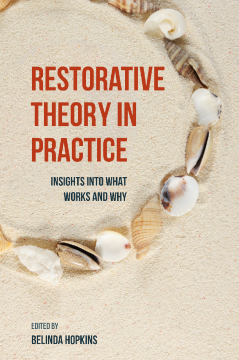
BOOK
Restorative Theory in Practice
Belinda Hopkins | Margaret Thorsborne | Pete Wallis | Mo Felton | Wendy Drewery | Mark Vander Vennen | Pam Denicolo | Shona Cameron | Ann Shearer | Dorothy Vaandering | Juliet Starbuck
(2015)
Additional Information
Book Details
Abstract
Restorative practice is an innovative approach to thinking about, and addressing, conflict and bullying, as well as disruptive, challenging and criminal behaviour. The approach is increasingly used to transform the culture of organisations, institutions and services and the way people communicate with one another.
In this book, ten practitioners describe a restorative encounter as seen through the lens of their own theoretical model. The book's unique structure is modelled on a restorative practice known as Circle Time- comprising of a Check-in, a Main Activity, and a Check-out. In the Check-in the practitioner explains how their own theoretical model informs their practice; in the Main Activity they comment on the same case studies to highlight how each theory can deepen our understanding of what might be happening and why; and in the Check-out they reflect on what they have learned from reading each other's contributions. This is a unique exemplar of how restorative theory and practice can influence how practitioners think, learn and write about restorative practice.
This will be an invaluable resource for restorative practitioners working across sectors including education, social services, youth offending or policy.
This new book is a valuable addition to the literature around restorative practice. Bringing together a range of contributors with experience of delivering restorative practice, and innovatively structured based around a restorative process, it examines restorative encounters from different perspectives and explores the ways in which successful outcomes may be achieved. Clear, accessible and interesting, this book is well worth reading for anybody interested in restorative practice.
Jon Collins, Chief Executive Officer, Restorative Justice Council, UK
As restorative justice continues to grow, expanding into new contexts and guided by practitioners from a wide range of backgrounds, it is critical that we maintain a solid foundation in the core guiding principles of the field and a strong connection to theories that support the work. Such a focus on restorative justice praxis brings together practice and theory, each informing the other and resulting in action that is guided by critical reflection. Belinda Hopkins contributes to this much-needed praxis by collaborating with ten leaders in the field of restorative justice who share the theories that support their work. This is not just a theory book, however; each of the theories is situated in ongoing work and applied in practical ways. This will definitely be a text I use in my classes.
Katherine Evans, Assistant Professor, Restorative Justice in Education, Eastern Mennonite University, Harrisonburg, Virginia, USA
Belinda Hopkins is Founder and Director of Transforming Conflict, the National Centre for Restorative Approaches in Youth Settings. She has been pioneering restorative approaches in youth settings across the UK and beyond for over 18 years. She regularly runs training courses, writes books and articles, develops training materials and speaks at conferences nationally and internationally. Belinda is the author of Just Care: Restorative Justice Approaches to Working with Children in Public Care and Just Schools: A Whole School Approach to Restorative Justice, also published by Jessica Kingsley Publishers.
In this book, Belinda Hopkins has brought together an important set of contributions in this maturing field of enquiry. It is no mean feat to structure a book in a way that reflects the restorative principles and process itself, but in doing so, she has successfully opened up space for debates on key issues from a range of significant perspectives. This thought provoking book will be helpful to practitioners, trainers and students alike.
Dr Gillean McCluskey, Head of Institute for Education, Community & Society, University of Edinburgh
It has been said that restorative justice is a practice in search of a theory. Thanks to Belinda Hopkins we now have ten theories succinctly outlined and applied to restorative practices. Practitioners, academics and students who want to analyse and deconstruct ideas that support restorative justice will find that this book will be an invaluable resource for many years.
Tim Chapman, Course Director, Ulster University Masters in Restorative Practices
